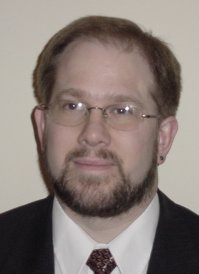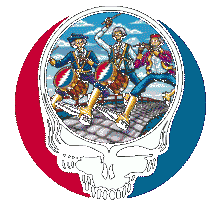Grateful Dead Preacher
 Chip Roush is the Senior Minister of the Unitarian Universalist Congregationof Grand Traverse. He likes to incorperate the Grateful Dead into his sermons.
Chip Roush is the Senior Minister of the Unitarian Universalist Congregationof Grand Traverse. He likes to incorperate the Grateful Dead into his sermons.He had this to say on his blog "The Yes Church":
As preparation for the upcoming three-sermon series, "Searching for the Sound: the Spirituality of the Grateful Dead," I met with the band leader this morning. He sang for me the new verse he'd written for "Lovelight," wherein the singer exhorts his partner to extend their love over a lifetime. *AND* instead of ending with "let it shine on me," he sings my version of amen, "so may we be!"Not only are we exploring the Grateful Dead's spirituality, we're making our own spirit more explicit, with their powerful music. I. Love. My. Job.
The Traverse City Record Eagle just did an article on him:
Message in the music
Pastor explores spiritual themes in Grateful Dead tunes
By Gretchen Murray
It was a clear-cut decision back in the '60s, either you loved the Grateful Dead, the bluesy folk band that got its start in San Francisco, or you went for the Beatles and the rest of the British Invasion.
Those who were "Deadheads” were the ones who pledged allegiance to the band and spent incredibly large quantities of time riding around in Volkswagen buses, tie-dying T-shirts and following the group from concert to concert.
Considered a part of a controversial youth culture movement that drifted into the 1970s and '80s, the Grateful Dead rose to icon status in the psychedelic era by selling its message of peace, love and understanding to adoring concert crowds. History doesn't deny that the concerts were venues for the emerging free drug, free love culture during those years, but fans who went to hear the music came away with a message.
Now, 40 years since the group got its start and 12 years after the death of lead guitarist Jerry Garcia silenced their music, some people who didn't get the message then are revisiting the Grateful Dead and finding a lyrical connection to religion and spirituality. That link is something Pastor Chip Roush of the Unitarian Universalist Congregation of Grand Traverse discovered. He plans to share it with his congregation in an upcoming three-part series, "Searching for the Sound: The Spirituality of the Grateful Dead.” The worship series begins Jan. 14 with "Fire from the Ice: The Religious Humanism of the Grateful Dead.”
"I use the Grateful Dead as a connective theme for several reasons,” Roush said. "It helps make our religious message relevant and accessible. We can derive wisdom from the Grateful Dead by first realizing that they were not all wasted drug users and secondly, there can be a human approach to religion. Because it comes from a 'surprising' source, people may be open to this wisdom in a different way than they would be to the usual Sunday sermon.”
Roush said that as the band's style evolved from blues, to country, to rock, they wrote about the common man and spoke to the human experience with its everyday glories and disasters.
"You know, each generation has a band or a movement that annoys the parents,” Roush said. "As individuals mature and get a better sense of the message, many people have probably thought, wow — I shouldn't have thrown away my Grateful Dead albums back in the '70s.”
A self-proclaimed Deadhead since college in the early 1980s — Roush said he's seen about two dozen shows — Roush finds the lyrics prompt individual responsibility to a fault and are laced with Christian metaphors.
"They use 'fate' instead of 'religion' and often refer to a higher being by using nature images such as, ' … a fountain, not made by the hands of man' in 'Ripple,' and even though they don't say who, they acknowledge that something is bigger than us,” he said. "There's a lot of different metaphor there for what we should be doing in our lives.”
Although the Unitarian Universalist Church is a liberal, open-minded religion that emphasizes individual responsibility, Roush expects the series to generate some raised eyebrows.
"I suspect a number (of people in his congregation) are excited about this series. Some know the music and have already made the connection. Others are skittish about references in the songs,” he said.
His sermon on Jan. 28 will be "Unbroken Chain: Individualism, Western Culture and the Grateful Dead.”
"Enlightenment gave birth to culture — a culture of individuals. But if we were to live as 260 million individuals in this country, that would not be a sustainable way of living. I plan to use the band's progression of thought in the lyrics of songs such as 'Althea' to talk about the need to work as a culture movement as the Grateful Dead did, as the Unitarian Universalists do and as the country does with respect to responsibility for its own beliefs.”
Roush plans to make the Feb. 4 installment as much like a Grateful Dead concert as possible — and still be a worship service.
"There will still be a deep connection to the Holy; it will simply manifest through lots of music and readings, bright colors and balloons. Like most Dead shows, it will be intergenerational,” he said.
The lecture "Move Me Brightly: The Inspiration Message of the Grateful Dead” will describe the "larger-than-us concept of how God works through us for bigger projects and asks the question, 'How do we organize to do good in the world?'
"I love the deep spirituality of the band — not just their lyrics, but the way they lived their lives, demonstrated a commitment to democracy, compassion and the right and responsibility of the individual conscience, and I celebrate their belief that there definitely IS something larger than ourselves,” he said.
He acknowledges that a lot of people in all walks of life are still drawn to the group.
"I know a huge number of people from laborers to professionals — mainstream Americans who are fans, and I think they heard the message.”
The Unitarian Universalist Congregation of Grand Traverse is located on the base of the Old Mission Peninsula at 6726 Center Road. Services are at 9:30 and 11 a.m. Dress is casual. Tie dyes are welcome. Call 947-3117.
You can read a sermon of his called "What a Long Strange Trip it's Been" here



1 Comments:
Did you ever notice how much that Salt Lake City Library building resembles the Coliseum in Rome? Not at all like the one in Chicago.
Post a Comment
<< Home